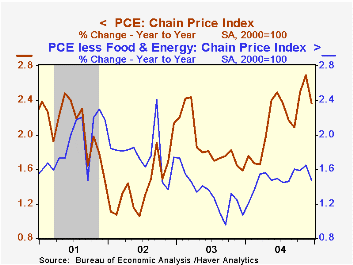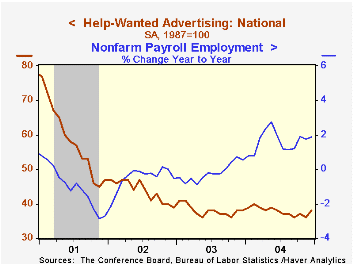 Global| Jan 31 2005
Global| Jan 31 2005Record Gain in U.S. Personal Income Fueled Spending
by:Tom Moeller
|in:Economy in Brief
Summary
Personal income surged a record 3.7% last month due to a $24.8B boost from Microsoft's payment of a $32B stock dividend. Consensus expectations had been for a 3.3% gain. Excluding the dividend effect, personal income rose 0.6%. Income [...]

Personal income surged a record 3.7% last month due to a $24.8B boost from Microsoft's payment of a $32B stock dividend. Consensus expectations had been for a 3.3% gain. Excluding the dividend effect, personal income rose 0.6%. Income for all of last year grew 5.4%, the most since an 8.0% gain in 2000.
Wage & salary income grew 0.4% (5.1% y/y) in December and for the year logged a 4.7% increase, also the strongest since 2000 when it rose 8.1%. Factory sector wages gained 0.4% (1.6% y/y) with the year's gain pegged at 2.1% following two years of decline.
Personal disposable income gained 4.0% (8.9% y/y) and the 5.7% rise for the full year was the strongest since a 7.5% gain in 2000. Adjusted for inflation, disposable income gained 3.4% last year.
Personal consumption rose an expected 0.8% in December driven by a 12.3% m/m gain in unit sales of motor vehicles. The 6.1% rise in total PCE for the full year was just behind the next strongest year's gain of 7.3% in 2000. Spending on nondurables was unchanged in December (8.5% y/y), held back by a 7.0% decline in gasoline prices and services spending rose 0.5% (5.6% y/y).
The PCE chain price index declined by 0.1%, the second monthly decline of 2004. Less food & energy prices also dipped slightly for the first time in over a year (+1.5% y/y).
| Disposition of Personal Income | Dec | Nov | Y/Y | 2004 | 2003 | 2002 |
|---|---|---|---|---|---|---|
| Personal Income | 3.7% | 0.4% | 8.6% | 5.4% | 3.2% | 1.8% |
| Personal Consumption | 0.8% | 0.4% | 6.4% | 6.1% | 5.2% | 4.6% |
| Savings Rate | 3.4% | 0.3% | 1.2% | 1.0% | 1.4% | 2.0% |
| PCE Chain Price Index | -0.1% | 0.2% | 2.4% | 2.2% | 1.9% | 1.4% |
| Less food & energy | -0.0% | 0.2% | 1.5% | 1.5% | 1.3% | 1.8% |
by Tom Moeller January 31, 2005

The National Index of Help-Wanted Advertising published by the Conference Board recovered to 38 in December, the highest level since June. For the full year the index averaged 38 which was the same as in 2003 but was below the 44 averaged in 2002.
During the last ten years there has been an 88% correlation between the level of help-wanted advertising and the year-to-year change in non-farm payrolls.
The proportion of labor markets with rising want-ad volume improved to 67% following the sharp drop the month prior to 37%.
The Conference Board surveys help-wanted advertising volume in 51 major newspapers across the country every month.
The latest report from the Conference Board is available here.
| Conference Board | Dec | Nov | Dec '03 |
|---|---|---|---|
| National Help Wanted Index | 38 | 36 | 38 |
by Tom Moeller January 31, 2005

The Chicago Purchasing Managers Business Barometer improved to 62.4 in January from an upwardly revised reading the month prior. Consensus expectations had been for a decline to 59.0.
During the last ten years there has been a 73% correlation between the level of the Chicago Business Barometer and the three month change in factory sector industrial output. That correlation has risen to 86% during the last five years.
The employment index recovered 1.7 points to 52.8 following a 7.8 point drop in December which was less than initially indicated. During the last twenty years there has been an 80% correlation between the level of this employment index and the three month change in factory sector employment. The new orders index also rose as did production but both series are below the autumn highs.
The index of prices paid fell sharply for the second month. During the last ten years there has been an 88% correlation between the Chicago price index and the three month change in the "core" intermediate goods PPI.
| Chicago Purchasing Managers Index, SA | Jan | Dec | Jan '04 | 2004 | 2003 | 2002 |
|---|---|---|---|---|---|---|
| Business Barometer | 62.4 | 61.9 | 64.5 | 62.9 | 54.7 | 52.7 |
| New Orders | 65.8 | 64.9 | 68.8 | 67.0 | 58.0 | 56.2 |
| Prices Paid | 76.5 | 84.4 | 67.8 | 80.1 | 55.8 | 56.9 |
by Tom Moeller January 31, 2005

Sales of new single-family homes improved modestly in December to 1.098M but sales in November were revised down sharply. Consensus estimates had been for sales of 1.200M. For the full year new home sales were a record 1.178M, up 8.1% from 2003.
The figures from the Census Department reflect homes sold as opposed to the figures on existing home sales from the National Association of Realtors which reflect closings of sales in earlier months.
Home sales were mixed throughout the country. In the Northeast sales fell to the lowest level since July but for the year were the highest since 1998. In the South sales also fell sharply to the lowest since July yet set a record for the year, adding 6.0% to the 13.8% gain in 2003. In the Midwest sales recovered nearly all of the prior month's plunge to finish the year up 10.8% at a record level. In the West, sales in December recovered some of the prior month's plunge to finish out a record year where sales rose 11.4% y/y and were more than double the levels of the early 1990s.
The median price of a new single family home recovered more than half of the prior month's decline. Rising to $222,000 (13.3% y/y), the annual gain in new home prices was the strongest since 1987.
| Homes Sales (000s, AR) | Dec | Nov | Y/Y | 2004 | 2003 | 2002 |
|---|---|---|---|---|---|---|
| New Single-Family | 1,098 | 1,097 | -2.0% | 1,178 | 1,089 | 976 |
Tom Moeller
AuthorMore in Author Profile »Prior to joining Haver Analytics in 2000, Mr. Moeller worked as the Economist at Chancellor Capital Management from 1985 to 1999. There, he developed comprehensive economic forecasts and interpreted economic data for equity and fixed income portfolio managers. Also at Chancellor, Mr. Moeller worked as an equity analyst and was responsible for researching and rating companies in the economically sensitive automobile and housing industries for investment in Chancellor’s equity portfolio. Prior to joining Chancellor, Mr. Moeller was an Economist at Citibank from 1979 to 1984. He also analyzed pricing behavior in the metals industry for the Council on Wage and Price Stability in Washington, D.C. In 1999, Mr. Moeller received the award for most accurate forecast from the Forecasters' Club of New York. From 1990 to 1992 he was President of the New York Association for Business Economists. Mr. Moeller earned an M.B.A. in Finance from Fordham University, where he graduated in 1987. He holds a Bachelor of Arts in Economics from George Washington University.
More Economy in Brief
 Global| Feb 05 2026
Global| Feb 05 2026Charts of the Week: Balanced Policy, Resilient Data and AI Narratives
by:Andrew Cates






